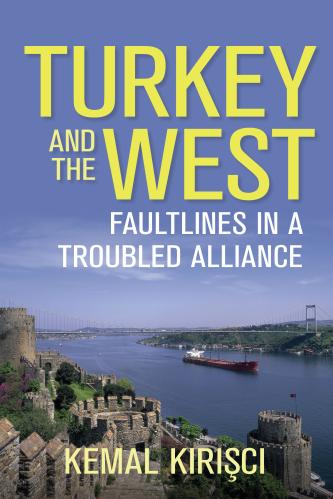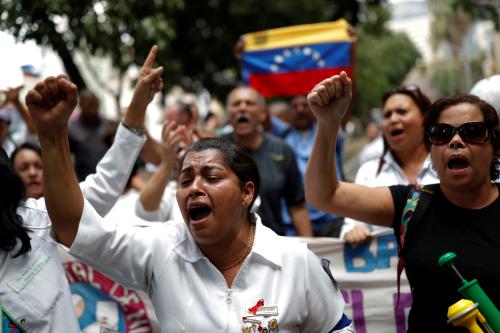This piece is part of a series on refugees in Turkey made possible by support from the Tent Partnership for Refugees. The views expressed are those of its authors and do not represent the views of Tent, their officers, or employees.
The inaugural Global Refugee Forum (GRF) will take place in Geneva this week to review international commitments to support the ever-growing number of refugees worldwide and the communities that host them. Representatives of states and international agencies, as well as refugees, academics, civil society actors, private sector representatives, and local government officials will all gather.
So far, and especially in the case of Turkey, support for refugees has focused on making them fit more easily into host country economies. But, with many Syrian refugees now condemned to precarious lives in Turkey’s informal economy with negative effects on wider Turkish society, it is clear that this approach is not sufficient. Instead, the GRF should consider an approach that creates demand for refugee labor: supporting refugees by pairing trade concessions with economic inclusion.
The background
The Forum was instituted by last year’s Global Compact on Refugees (GCR) to track progress on burden-sharing with countries hosting large numbers of refugees. The GCR’s objectives include “to ease pressures on host countries; enhance refugee self-reliance; expand access to third-country solutions; and support conditions in countries of origin for a safe and dignified return.”
Improving refugee access to jobs and livelihoods is a particular focus this year. The traditional refugee-response system — based on finding durable solutions to forced displacement through local integration, resettlement, and repatriation — is “broken.” And so, improving refugee self-reliance has become paramount. This is doubly important because, as the U.N. High Commissioner for Refugees (UNHCR) found, the average duration of the 32 protracted refugee situations at the end of 2015 is estimated at about 26 years. With the total refugee population now at an all-time high of 25.9 million (close to 85% of whom find themselves in developing countries), it’s imperative to ensure that refugees can be productive members of society — not a burden on host countries dependent on humanitarian largesse.
In this respect, the GCR calls on the international community to adopt measures to “foster inclusive economic growth for host communities and refugees” and calls for the strengthening the skills of refugees through “specific training programmes, including language and vocational training” to improve the employability of the refugees.
The case of Turkey
Turkey — which hosts the largest number of refugees in the world, with more than 3.6 million Syrians and close to 400,000 of other national backgrounds —has adopted this approach. Since January 2016, the Turkish government has opened its labor market to Syrian refugees, and there has been a concerted effort between the government, the international community, and local stakeholders to move Syrian refugees into the formal economy. These efforts began with the EU Action Plan, through which Turkey agreed to slow down the flow of Syrian refugees in 2015 to Europe, which also envisaged “the enhancement of [their] self-sufficiency and participation in economy” and was quickly incorporated in the Regional Refugee and Resilience Plan for 2016-17 (3RP).
Since then, with financial support primarily from the EU Facility for Refugees in Turkey (FRIT) and leading donor countries such as Germany, Japan, the Netherlands, Canada, and the United States, there has been an effort underway to manage the presence of Syrian refugees. (That effort involves a range of U.N. agencies — the International Organization for Migration, the International Labour Organization, the U.N. Development Programme, UNHCR, and others — as well as local and international organizations and Turkish government agencies.) It seeks to meet the humanitarian needs of the refugees and also create employment opportunities for Syrian refugees through language and vocational training programs. Thus far, however, these efforts have generated few decent jobs for refugees.
For example, in 2018, 3RP livelihood partners “trained, counselled and supported business start-ups for a total of 54,597 Syrians under temporary protection and host community members,” constituting — together with those reached in 2017 — 15% of almost half a million people identified as needing support to increase their employability. Yet these efforts have achieved limited success in terms of placing refugees into real jobs and initiating new business ventures. Of the almost 55,000 targeted refugees and locals, only 3,334 were placed “into jobs or income opportunities,” and another 1,879 were able to start their own businesses. This result represents only a marginal improvement in employment and a fall in people starting their own businesses from 2017, when the respective figures were 1,667 and 2,180 people. The most recent 3RP strategy report for 2019-20 recognizes the limited nature of the achievement and the need to significantly scale up efforts to meet the growing need for self-reliance.
The number of Syrian refugees who have received work permits is also disappointingly low. Only around 65,000 work permits were issued by the end of 2018, according to the Interior Minister of Turkey. Unsurprisingly, in an economy where more than one-third of workers are employed informally and unemployment is soaring, some one million Syrian refugees are informally and irregularly employed. This work inevitably comes with low wages — well below the legally prescribed minimum pay — as well as poor working conditions and exploitation, especially among children and women.
This picture also exacerbates public resentment driven by falling wages and rising unemployment among unskilled local labor. A survey conducted in late 2017 found that more than 71% of respondents believed that Syrians were taking jobs away from Turkish people.
In terms of “easing pressure on host countries” and “enhancing refugee self-reliance,” this is not a very promising picture. It will be important that during deliberations at the GRF, a promising policy idea from the GCR receives its due attention to improve prospects of increasing livelihood and job opportunities for refugees: through trade concessions.
Trade as a key ingredient
The GCR suggests exploring extending “preferential trade arrangements … especially for goods and sectors with high refugee participation” to the countries hosting large numbers of refugees. A similar idea was also discussed at the 2016 London Conference on Supporting Syria and the Region. There, participants recognized the utility of enabling improved access to external markets as a policy tool not only to encourage host governments to open up their labor market to refugees, but also to help create jobs for local populations.
In its January 2019 report calling to reform the global refugee system, the World Refugee Council also emphasized that trade concessions can spur economic growth to the benefit both of refugees and their host communities. Finally, the European Commission listed gaining access to “export markets … and providing preferential export and trading status to specific products” as a “priority action” for improving Syrian refugees’ self-reliance specifically in Turkey in its assessment report for FRIT.
These policy suggestions are fully in line with the notion that trade liberalization through the reduction of tariffs, the expansion or even full elimination of quotas, and the resolution of regulatory obstacles is a key driver of economic growth and employment. Such economic growth would also help create demand for the skills and labor of refugees and compliment efforts focused on increasing their employability.
But these ideas need to be operationalized more fully. Currently, the EU-Jordan Compact is the only functioning example of a deal matching trade concessions with refugee labor. In this compact, the EU agreed to give Jordan facilitated access to its markets, particularly for textile products, in return for the issuance of work permits to Syrian refugees employed in Jordanian companies. The benefits of this are twofold. They offer Syrian refugees economic opportunities on the one hand, and benefit Jordan’s development on the other by expanding its industrial production base through exports to the EU. These benefits were also expected to improve social cohesion in Jordan by improving employment opportunities for refugees — through greater inclusion in the formal economy — and Jordanians at the same time. Currently in its third year, the compact has not yet reached its full potential, in particular due to a failure to achieve a significant number of legally employed Syrians. Furthermore, the absence thus far of any significant growth in Jordanian exports to the EU has been attributed to weak trade concessions marked by the compact’s failure to include almost two-thirds of Jordan’s current international exports. Nevertheless, it is still regarded by some experts as a game-changer for demonstrating “how host countries and the international community respond to protracted refugee situations.”
Towards self-reliance
As I have previously discussed, the size of the Turkish economy and the already high level of economic integration between the EU and Turkey make meaningful preferential trade arrangements possible (arrangements that can expand Turkish agricultural exports to the EU to improve the employment of Syrian refugees). Such a scheme would of course need to be accompanied by a certification and monitoring mechanism that would help ensure compliance by Turkish companies and large farms with the terms of an EU-Turkey compact.
But any difficulty associated with this potential compact would be outweighed by the benefit it would provide to large number of Syrian refugees working in Turkish agricultural sector under precarious circumstances. The GRF offers an opportunity to explore just such a compact and also make improvements to the EU-Jordan Compact to benefit future attempts to help refugees achieve sustainable self-reliance.
The Brookings Institution is committed to quality, independence, and impact.
We are supported by a diverse array of funders. In line with our values and policies, each Brookings publication represents the sole views of its author(s).









Commentary
How to leverage trade concessions to improve refugee self-reliance and host community resilience
December 15, 2019